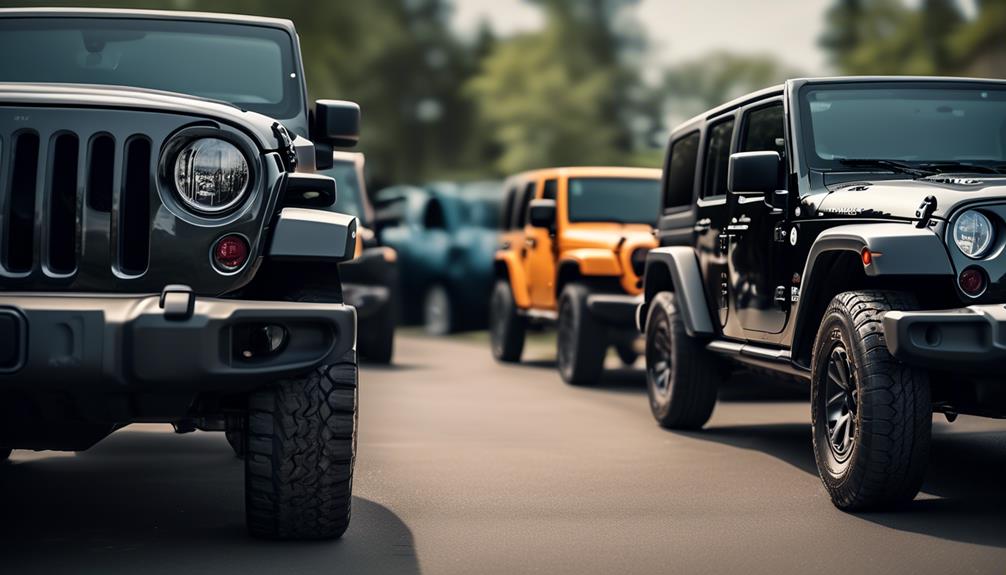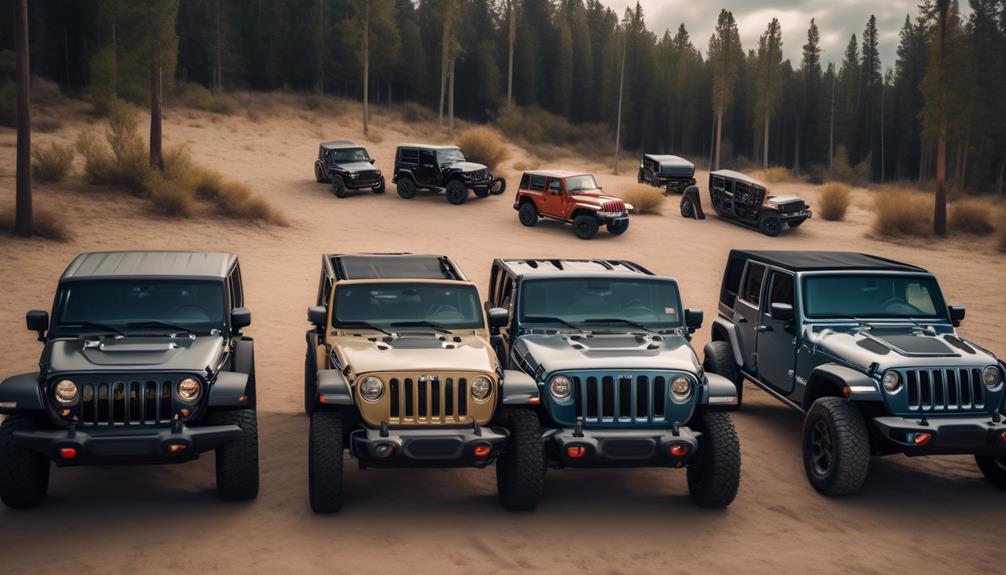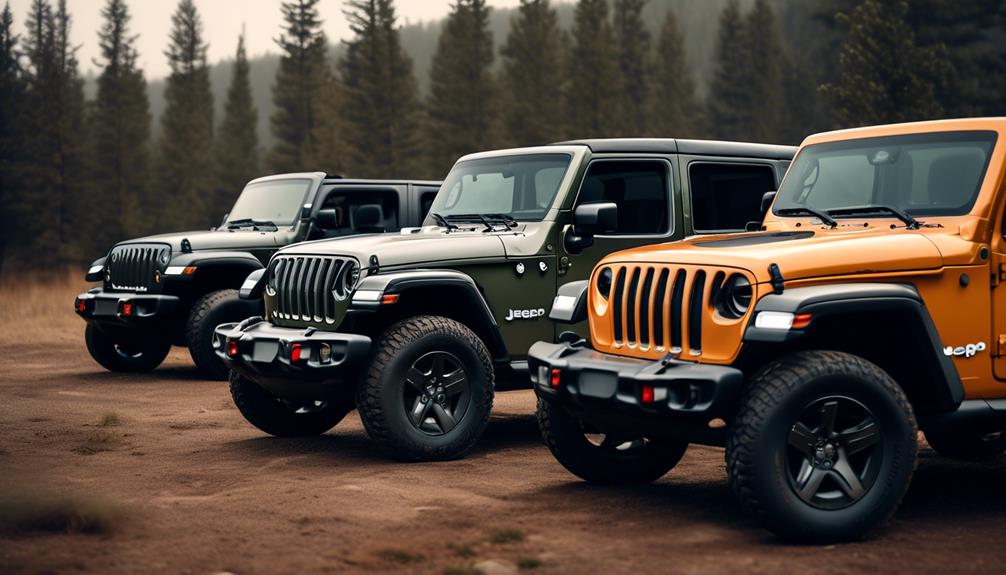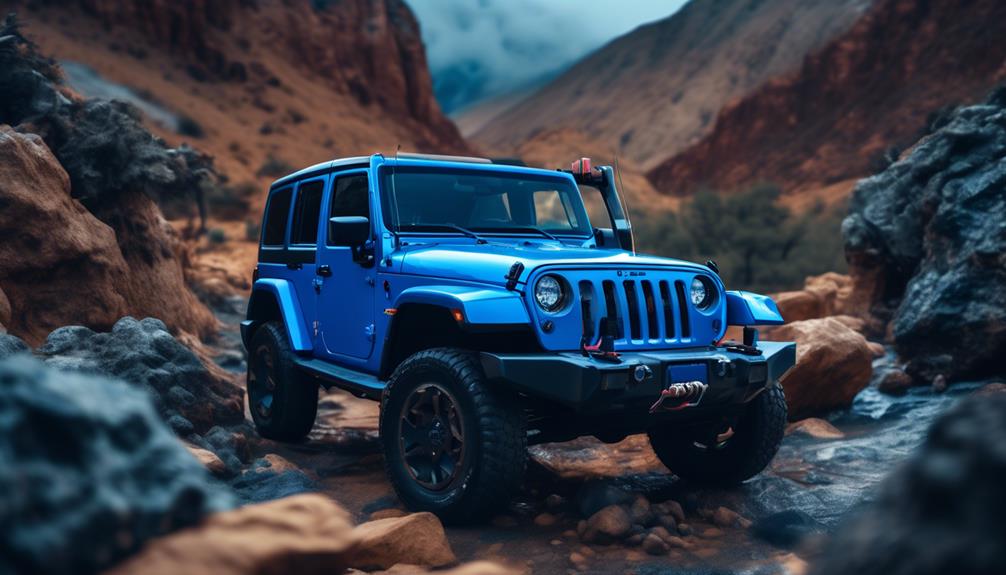The weight of a Jeep Wrangler is a topic of interest for many enthusiasts and potential buyers alike. It plays a crucial role in determining its performance, fuel efficiency, and overall capabilities. However, pinpointing an exact weight for a Jeep Wrangler isn't as straightforward as one might think. Various factors contribute to its weight, including trim levels, configurations, and modifications. In this discussion, we will delve into the different aspects that affect the weight of a Jeep Wrangler and explore the variations that exist among different trims and setups. By the end, you will have a better understanding of how to choose the right Jeep Wrangler weight that suits your needs. So, let's dive into this weighty topic and uncover the fascinating details behind the numbers.
Key Takeaways
- The weight of a Jeep Wrangler is influenced by factors such as body style, drivetrain, and optional features.
- The weight increases as you move up trim levels, with the base model being the lightest.
- The weight distribution of a base Jeep Wrangler is evenly balanced between the front and rear axles, impacting stability, control, and off-road capabilities.
- Different configurations chosen by buyers can result in variations in weight and performance, emphasizing the importance of understanding individual needs and priorities.
Jeep Wrangler Weight: An Overview

The weight of a Jeep Wrangler is a crucial factor to consider when it comes to its performance, fuel efficiency, and overall capabilities. The weight distribution of a Jeep Wrangler plays a significant role in its off-roading performance. With proper weight distribution, the Jeep Wrangler can maintain stability and traction while navigating challenging terrains.
The weight of a Jeep Wrangler varies depending on the model and configuration. On average, a two-door Jeep Wrangler weighs around 3,900 to 4,100 pounds, while a four-door model can weigh between 4,200 and 4,500 pounds. The weight distribution of a Jeep Wrangler is typically 50:50 between the front and rear axles, which helps to maintain balance and stability during off-road maneuvers.
The impact of weight on off-roading performance is significant. A lighter Jeep Wrangler tends to be more agile and nimble, making it easier to maneuver through tight spaces and conquer obstacles. On the other hand, a heavier Jeep Wrangler may provide better traction and stability, especially when climbing steep inclines or traversing uneven terrain.
However, excessive weight can negatively affect fuel efficiency and overall performance. The additional weight increases the strain on the engine, resulting in lower fuel economy. Moreover, a heavier Jeep Wrangler may struggle to navigate through deep mud or soft sand due to the increased likelihood of sinking.
Factors Affecting Jeep Wrangler Weight
Several factors contribute to the weight of a Jeep Wrangler, ultimately impacting its performance and capabilities. Understanding these factors can help potential buyers make informed decisions and optimize their driving experience. Here are three key factors that affect the weight of a Jeep Wrangler:
- Body Style: The body style of a Jeep Wrangler plays a significant role in its weight. The traditional two-door model is generally lighter than the four-door Unlimited version due to its smaller size and reduced number of components. The choice between these body styles will depend on individual preferences and needs.
- Drivetrain: The type of drivetrain also affects the weight of a Jeep Wrangler. The standard rear-wheel-drive configuration is lighter compared to the heavier four-wheel-drive system. Additionally, choosing between different four-wheel-drive options, such as part-time or full-time systems, can impact the overall weight of the vehicle.
- Optional Features: Jeep Wranglers offer a range of optional features and packages that can add weight to the vehicle. These may include larger wheels and tires, upgraded suspension systems, or additional off-road accessories. While these features can enhance the Jeep's performance and capabilities, they also contribute to its overall weight.
The weight of a Jeep Wrangler has a direct impact on its performance and fuel efficiency. A heavier vehicle requires more energy to move, which can result in reduced acceleration and decreased fuel efficiency. Additionally, the added weight can affect the Jeep's off-road capabilities, making it less nimble and agile on challenging terrains.
It is important for potential buyers to consider these factors when choosing a Jeep Wrangler to ensure they select a vehicle that aligns with their needs and preferences. By understanding the impact of weight on performance and fuel efficiency, individuals can make informed decisions and optimize their driving experience.
Weight Differences Among Jeep Wrangler Trims

When comparing the weight differences among Jeep Wrangler trims, it becomes evident that the choice of trim level significantly impacts the overall weight of the vehicle. The weight distribution of a Jeep Wrangler plays a crucial role in its performance, both on and off the road. Let's delve into the details of how the weight varies among different trims, and how it affects the overall performance of the vehicle.
The weight of a Jeep Wrangler depends on various factors such as the inclusion of additional features, body style, and drivetrain options. Generally, the base model of the Jeep Wrangler, known as the Sport trim, has the lowest weight. As you move up the trim levels, such as the Sahara and Rubicon, the weight tends to increase due to the inclusion of more luxurious features and off-road enhancements.
The weight distribution of a Jeep Wrangler is designed to provide optimal performance in various driving conditions. The positioning of heavy components, such as the engine and transmission, towards the front of the vehicle helps in achieving better traction and stability. This weight distribution also aids in maintaining the Wrangler's legendary off-road capabilities.
The impact of weight on the performance of a Jeep Wrangler is twofold. On one hand, a lighter vehicle tends to have better acceleration and handling, making it easier to maneuver in tight spaces. On the other hand, a heavier vehicle provides more stability and control, especially when traversing challenging terrains.
It is important to note that while the weight differences among Jeep Wrangler trims can affect performance, the overall design and engineering of the vehicle ensure that each trim level delivers an impressive off-road experience. Ultimately, the choice of trim level should be based on individual preferences and priorities, whether it be a lighter vehicle for urban driving or a heavier one for more rugged off-road adventures.
Understanding the Weight of a Base Jeep Wrangler
To understand the weight of a base Jeep Wrangler, it is essential to consider the key factors that contribute to its overall mass. The weight distribution of a vehicle plays a crucial role in its handling and performance. In the case of the Jeep Wrangler, the weight is evenly distributed between the front and rear axles. This balance ensures stability and control, especially when navigating off-road terrain. Additionally, the weight distribution helps to optimize traction and prevent wheel slippage, further enhancing the Wrangler's off-road capabilities.
Another important aspect to consider is the impact of weight on fuel efficiency. The base Jeep Wrangler is designed to be a rugged and capable off-road vehicle, which means it tends to be heavier than other compact SUVs. The extra weight can have a slight impact on fuel efficiency, as it requires more energy to move the vehicle. However, Jeep has taken steps to mitigate this by incorporating lightweight materials and aerodynamic features into the Wrangler's design.
Furthermore, the weight of a base Jeep Wrangler can vary depending on additional features and options chosen by the buyer. For example, opting for a hardtop or a larger engine can increase the overall weight of the vehicle. It is important for potential buyers to consider their specific needs and priorities when selecting these options, as they can affect the vehicle's weight and performance.
Exploring Weight Variations With Different Configurations

The weight of a base Jeep Wrangler can significantly vary depending on the different configurations chosen by the buyer. When comparing weight variations between Jeep Wrangler models, it is important to consider the impact of additional accessories on the overall weight of the vehicle.
Different Jeep Wrangler models come with various features and options that can affect their weight. For instance, the two-door Wrangler Sport model has a base curb weight of around 3,970 pounds, while the four-door Wrangler Unlimited Sahara model has a base curb weight of approximately 4,500 pounds. This difference in weight is primarily due to the larger size and additional features of the Wrangler Unlimited model.
In addition to the model variations, the weight of a Jeep Wrangler can also be influenced by the additional accessories chosen by the buyer. Accessories such as a hardtop roof, winch, off-road bumpers, and larger tires can add extra weight to the vehicle. It is essential to consider these added features when comparing the weight of different Jeep Wrangler configurations.
The weight of a Jeep Wrangler is an important consideration for buyers as it can impact the vehicle's performance and fuel efficiency. Heavier configurations may offer more stability and towing capacity but may also result in reduced fuel economy. On the other hand, lighter configurations may provide better agility and fuel efficiency but may sacrifice some towing capacity.
Ultimately, the weight of a Jeep Wrangler depends on the specific configuration and accessories chosen by the buyer. It is essential to carefully consider these factors to ensure that the vehicle meets the desired requirements and preferences of the buyer.
How Modifications Can Impact Jeep Wrangler Weight
Modifications to a Jeep Wrangler can have a significant impact on its overall weight. Whether you are adding aftermarket accessories or employing weight reduction techniques, it is essential to understand how these modifications can affect the weight of your vehicle. Here are some factors to consider:
- Impact of aftermarket accessories:
- Bumpers: Upgrading to heavier steel bumpers can add significant weight to your Jeep Wrangler.
- Winches: Installing a winch can increase the weight by 50-100 pounds, depending on the model.
- Roof racks: Adding a roof rack for extra storage can contribute to additional weight, especially when loaded with gear.
- Weight reduction techniques:
- Aluminum parts: Replacing heavy steel components with lighter aluminum alternatives can help reduce overall weight.
- Removing unnecessary accessories: Analyze your Jeep's accessories and remove any that are not essential, such as backseat headrests or cargo organizers.
- Lightweight wheels: Swapping heavy steel wheels for lighter alloy or aluminum wheels can significantly decrease weight.
- Balancing modifications:
- Consider the overall weight distribution when making modifications. Adding weight to the front or rear of the vehicle can impact its balance and handling.
- Ensure that any modifications comply with safety regulations and do not exceed the manufacturer's recommended weight limits.
Conclusion: Choosing the Right Jeep Wrangler Weight for Your Needs

After considering the impact of modifications on a Jeep Wrangler's weight, it is important to carefully choose the right weight for your specific needs. When it comes to weight considerations, finding the perfect balance is crucial to ensure optimal performance and safety.
When deciding on the weight of your Jeep Wrangler, you need to take into account several factors. First, consider your intended use for the vehicle. If you plan on off-roading or towing heavy loads, a heavier Jeep may be more suitable as it can provide better stability and traction. On the other hand, if you primarily use your Jeep for daily commuting or light off-roading, a lighter weight may improve fuel efficiency and maneuverability.
Another factor to consider is the terrain you will be driving on. If you frequently encounter steep inclines or rugged terrains, a heavier Jeep can provide more control and stability. However, if you will be driving mostly on flat or paved surfaces, a lighter weight can enhance acceleration and agility.
It is also important to consider the impact of weight on fuel efficiency. Heavier Jeeps generally have lower fuel efficiency compared to lighter ones. So, if fuel economy is a priority for you, opting for a lighter Jeep may be the better choice.
Ultimately, finding the perfect weight for your Jeep Wrangler is a personal decision that depends on your specific needs and preferences. It is recommended to test drive different models with varying weights to determine which one suits you best. By considering these weight considerations and finding the right balance, you can ensure an enjoyable and safe driving experience with your Jeep Wrangler.
Frequently Asked Questions
What Is the Maximum Weight Capacity of a Jeep Wrangler?
The maximum weight capacity of a Jeep Wrangler refers to the maximum amount of weight it can safely carry. This capacity is determined by various factors, including the vehicle's design, construction, and weight distribution. Weight distribution is crucial for maintaining stability and ensuring safe handling of the vehicle. It is important to consult the specific model's specifications and guidelines provided by the manufacturer to determine the maximum weight capacity of a Jeep Wrangler.
How Does the Weight of a Jeep Wrangler Affect Its Fuel Efficiency?
The weight of a Jeep Wrangler can have a significant impact on its fuel efficiency. A heavier vehicle requires more engine power to move, which can result in increased fuel consumption. Additionally, a heavier Jeep Wrangler may have reduced handling and maneuverability, as the added weight can affect the vehicle's balance and responsiveness. It is important for drivers to consider the weight of their Jeep Wrangler when considering its fuel efficiency and overall performance.
Can the Weight of a Jeep Wrangler Impact Its Off-Road Performance?
The weight of a Jeep Wrangler can have a significant impact on its off-road performance. The handling capabilities of the vehicle can be affected by its weight, as a heavier Jeep may be more difficult to maneuver in challenging terrain. Additionally, the weight can also impact the suspension performance, as a heavier vehicle may experience more strain on the suspension system when navigating rough terrains. Therefore, it is important to consider the weight of a Jeep Wrangler when evaluating its off-road capabilities.
Are There Any Weight Restrictions for Towing With a Jeep Wrangler?
Weight restrictions are an important consideration when it comes to towing with a Jeep Wrangler. It is essential to consult the vehicle's manual or specifications to determine the maximum towing capacity. Exceeding this limit can lead to damage to the vehicle, decreased performance, and potential safety hazards. For example, let's consider a hypothetical scenario where a Jeep Wrangler has a towing capacity of 3,500 pounds. In this case, it is crucial to ensure that the weight of the trailer and its contents do not exceed this limit to maintain optimal towing performance and safety.
Does the Weight of a Jeep Wrangler Affect Its Resale Value?
The weight of a Jeep Wrangler can have an impact on its resale value. A heavier Wrangler may result in higher insurance premiums due to increased risk of accidents. Additionally, a heavier vehicle can affect overall vehicle handling and fuel efficiency, which may deter potential buyers. However, it is important to note that other factors such as condition, mileage, and market demand also play a significant role in determining the resale value of a Jeep Wrangler.
Conclusion
In conclusion, understanding the weight of a Jeep Wrangler is crucial when considering its capabilities and potential modifications. The weight of a base Jeep Wrangler varies depending on the specific model and trim, while modifications can further impact its weight. For example, adding heavy aftermarket accessories like winches or lift kits will increase the overall weight of the vehicle. By carefully considering your needs and preferences, you can choose the right Jeep Wrangler weight that aligns with your desired performance and off-road capabilities.

